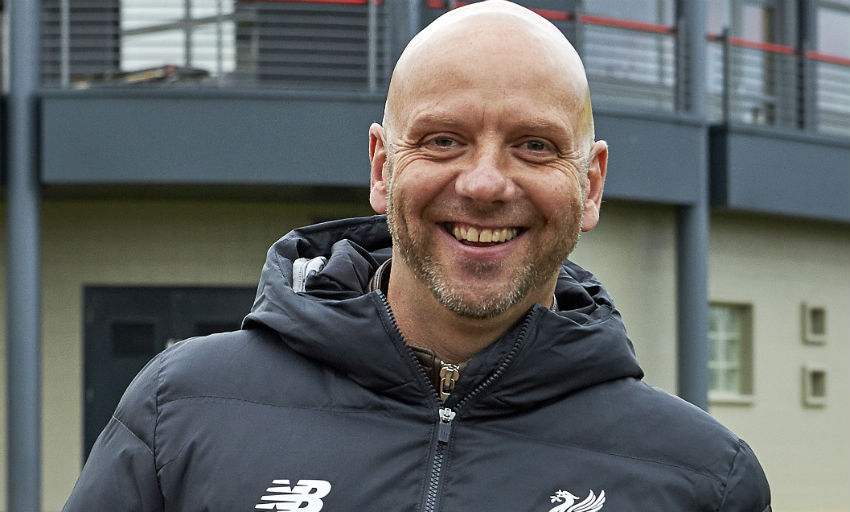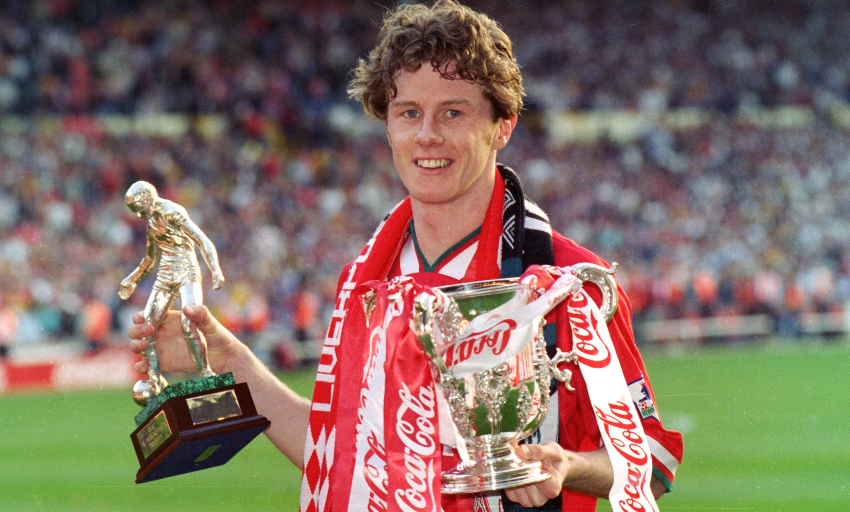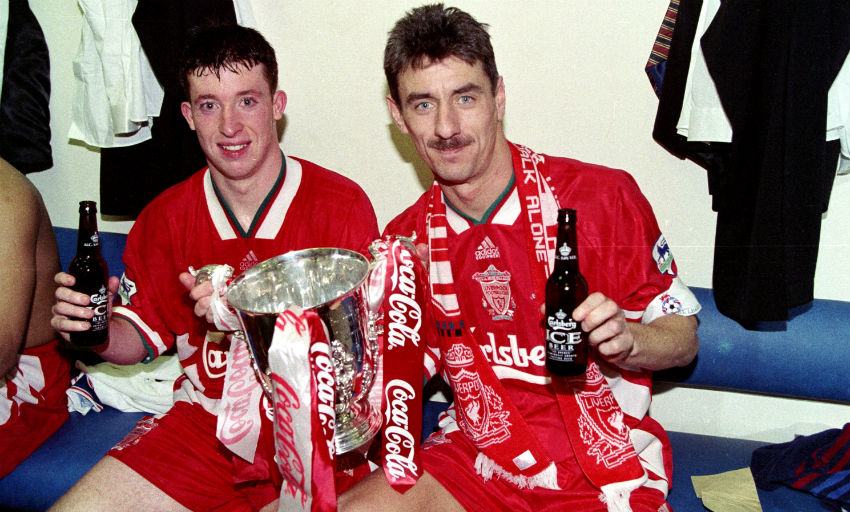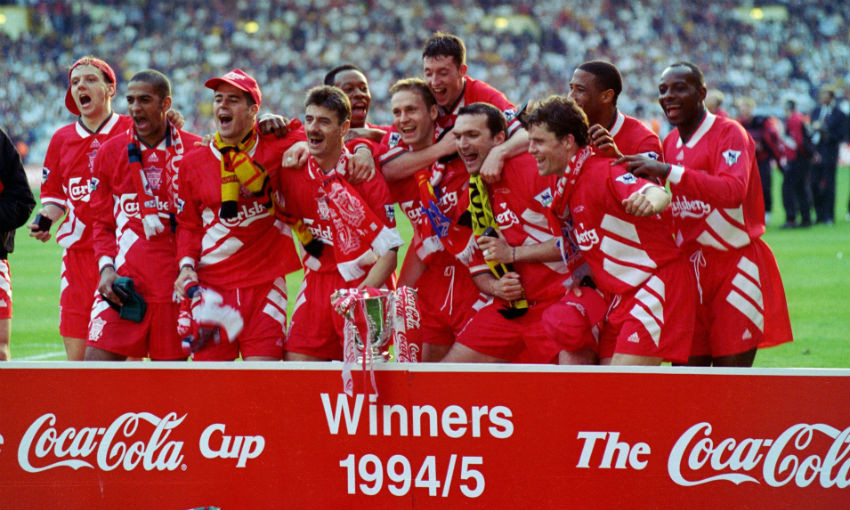25 years on: Remembering the 1995 League Cup triumph
In the long and storied history of Liverpool FC, every triumph is different.
Ask any fan that’s followed the club over the last three decades for their most cherished memories and they’ll certainly mention Istanbul or Madrid, Cardiff or Dortmund.
The events of 25 years ago today, when the Reds defeated Bolton Wanderers 2-1 at Wembley to lift their fifth League Cup, would possibly come further down the list for some.
But every piece of silverware has its own unique backstory and significance, and on its 25th anniversary we have taken another look at the meaning behind the 1995 League Cup glory.
Classic Match: 1995 League Cup final
Secured 14 months after Roy Evans had succeeded Graeme Souness, the term ‘transition’ certainly applies to the Liverpool squad at the time of the victory. For club legends Ian Rush and John Barnes, the Coca-Cola Cup - as it was known then - was the last major honour they won in the twilight years of their superlative Anfield careers.
For Evans, it was his only one as Liverpool manager, for all the undoubted thrills and spills of his time in charge. The same is also true of five starters for the Reds that sunny Sunday afternoon.
That list does not include Rob Jones, who had also featured in the 1992 FA Cup final aged just 20. The story of Jones’ career is well-known, but in 1994-95 the young right-back was still very much in his prime and one of the first names on Evans’ teamsheet, making 46 appearances in total, including eight in the League Cup as Liverpool dismissed Arsenal and that season’s title winners Blackburn Rovers among others on the road to the national stadium.
“I had already won the FA Cup, but every final you get to is so important,” Jones tells Liverpoolfc.com. “People will say the League Cup isn’t as prestigious, but when you’ve worked all season to get yourself there, you really want to win it.
“Bolton had done really well to get there and I think some people thought we were going to batter them 5-0 or 6-0. It was never going to be like that.”

In fact, Bruce Rioch’s Bolton were a considerable obstacle despite their First Division status, begging to be underestimated. Wanderers were promoted to the Premier League two months later but, first and foremost, they were cup specialists - having tripped up top-tier outfits Ipswich Town, West Ham United and Norwich City along the way to the Wembley showpiece, not to mention ending Souness’ team’s defence of the FA Cup with a shock 2-0 win at Anfield back in 1993.
“I think it brings a different form of pressure, and it did make the build-up intense,” Jones observes. “Everyone’s expecting you to win, but Bolton had got there on merit.
“In the back of your mind there is that extra bit of pressure: ‘If we get beat here, we’re going to get caned, we’re Liverpool Football Club, we shouldn’t be losing to a lower-league team.’ But they played really well on the day and put up a great fight.”
Bolton’s line-up also contained a couple of Trojan Horses, so to speak, in the form of Scousers Alan Stubbs and Jason McAteer, with the latter particularly keen to impress in order to win the move to his boyhood heroes which would indeed come to pass a few months later.
The Birkenhead-born midfielder was to be outshone by another rising star from just across the water in Bootle, though.

Shortly before half-time, Steve McManaman collected a pass from Barnes and decided to take on the Bolton defence on his own, dribbling out to the right side of the box where he nutmegged Scott Green and bobbled a low shot past ‘keeper Keith Branagan and into the net.
It was a superb individual goal, but one the England winger would better with just over 20 minutes left.
Rioch’s men were caught on the counter this time, McManaman running all the way from the halfway line, leaving the beleaguered Green in his dust again and beating another man before guiding a low shot into the far corner.
“That’s just sheer class. This guy is having the time of his life out there on that Wembley pitch,” reacted co-commentator Kevin Keegan, perhaps put in mind of his own memorable double for Liverpool at the same venue in the 1974 FA Cup final.
For Jones, it was no real surprise to see his close friend nervelessly, nonchalantly doing his thing on such a pressure occasion, even in Evans’ 3-5-2 system, which required both of the 23-year-olds to take on different roles to the ones they were used to.
“The thing with Steve is, he was consistent throughout his career, but we always say about big players in big games at big venues such as Wembley, ‘Can you produce?’ Because some of those big names can’t, but Macca always seemed to. He ran Bolton ragged that day.
“I didn’t mind playing that system, I had played wing-back quite a few times, even when I was at Crewe. It was pretty similar to full-back except you’re less tucked in and more up and down, getting your crosses in.
“Macca, more or less, had a free role; he would come onto my side a bit, then switch over to Stig’s [Inge Bjornebye] side. We had found that teams were tending to try to mark Macca man to man, so we always felt that if he moved around it made it more difficult for someone to follow him round the pitch and he could really cause havoc.”
Bolton were nothing but resilient and responded to McManaman’s second almost immediately with a stunning goal of their own; Alan Thompson’s half-volley on the turn crashing into the top corner of David James’ net.
But Liverpool held out to secure their first trophy for three years - a comparatively long drought for Kopites who had become accustomed to winning at least one every season during the ’70s and ’80s.
For Rush and Barnes, the day had the added resonance of a last hurrah as they would leave the club one and two years later respectively.

“Rushie was always very competitive; it didn’t matter how many European Cups he’d won, he wanted to win that,” notes Jones. “And being captain made it special for him.
“Even at that age, getting towards the end of his career, he adapted his game to play a different style for the team, and John was the same.
“After a few injuries he realised he couldn’t always be the one on the wing, taking everyone on, so he adapted. And I suppose Macca did a similar thing later in his career, he became more of a playmaker and wasn’t that dribbler you had seen against Bolton. That shows you the ability and the quality of these players.”
So, what did the post-match celebrations entail?
“I think it was really low-key, to be honest!” laughs Jones. “I think we had a game midweek after that, so in terms of celebrations we just had a couple of beers in the hotel after, and then back to Liverpool. I think we went back the next morning, but I could be wrong! It was 25 years ago…”



